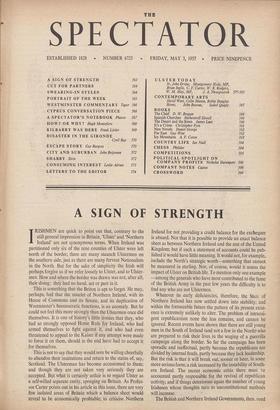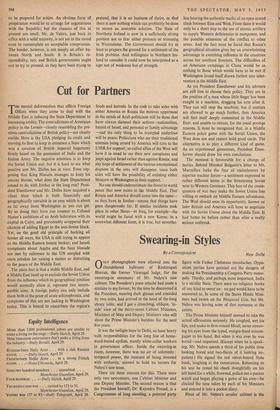A SIGN OF STRENGTH
IRISHMEN are quick to point out that, contrary to the still general impression in Britain, 'Ulster' and 'Northern Ireland' are not synonymous terms. When Ireland was partitioned only six of the nine counties of Ulster were left north of the border; there are many staunch Ulstermen on the southern side, just as there are many fervent Nationalists in the North. But for the sake of simplicity the Irish will perhaps forgive us if we refer loosely to Ulster, and to Ulster- men. How and where the border was drawn was not, after all, their doing : they had no hand, act or part in it.
This is something that the Briton is apt to forget. He may, perhaps, feel that the statelet of Northern Ireland, with its House of Commons and its Senate, and its duplication of Westminster's bureaucratic functions, is an anomaly. But he could not feel this more strongly than the Ulstermen once did themselves. It is one of history's little ironies that they, who had so strongly opposed Home Rule for Ireland, who had armed themselves to fight against it, and who had even threatened to appeal to the Kaiser if any attempt were made to force it on them, should in the end have had to accept it for themselves.
This is not to say that they would now be willing cheerfully to abandon their institutions and return to the status of, say, Scotland. The Ulsterman has become accustomed to them; and though they are not taken very seriously they are accepted. But what is certainly unfair is to regard Ulster as a self-willed separate entity, sponging on Britain. As Profes- sor Carter points out in his article in this issue, there are very few isolated areas of Britain which a balance sheet would reveal to be economically profitable; to criticise Northern Ireland for not providing a credit balance for the exchequer is absurd. Not that it is possible to provide an exact balance sheet as between Northern Ireland and the rest of the United Kingdom; but if such a statement of accounts could be pub- lished it would have little meaning. It would not, for example, include the North's strategic worth—something that cannot be measured in sterling. Nor, of course, would it assess the impact of Ulster on British life. To mention only one example —among the generals who have most contributed to the fame of the British Army in the past few years the difficulty is to find any who arc not Ulstermen.
Whatever its early deficiencies, therefore, the State of Northern Ireland has now settled down into stability; and within the foreseeable future the pattern of its present exist- ence is extremely unlikely to alter. The problem of intransi- gent republicanism none the less remains, and cannot be ignored. Recent events have shown that there are still young men in the South of Ireland (and not a few in the North) who are prepared to risk their lives in the waging of a guerrilla campaign along the border. So far the campaign has been sporadic and ineffectual, partly because the republicans are divided by internal feudS, partly because they lack leadership. But the risk is that it will break out, sooner or later, in some more serious form;`a risk increased by the instability of South- ern Ireland. The recent economic crisis there must be accounted partly responsible for the revival of republican activity; and if things deteriorate again the number of young Irishmen whose thoughts turn to unconstitutional methods will increase.
The British and Northern Ireland Governments, then. need
to be prepared for action. An obvious form of preparation would be to arrange for negotiations with the Republic; but the chances of this at present are small. Mr. de Valera, just back in office with a solid majority, is not yet in the mood even to contemplate an acceptable compromise. The border, however, is not simply an affair be- tween North and South. It is Britain's re- sponsibility, too; and British governments ought not to try to pretend, as they have been trying to pretend, that it is no business of theirs, or that there is now nothing which can profitably be done to secure an amicable solution. The State of Northern Ireland is now in a sufficiently strong position not to fear either pressure or trimming in Westminster. The Government should try at least to prepare the ground for a settlement of the Irish problem. And willingness in Northern Ire- land to consider it could now be interpreted as a sign not of weakness but of strength.











































 Previous page
Previous page